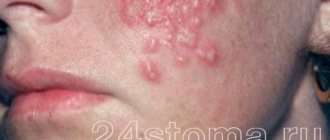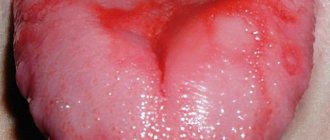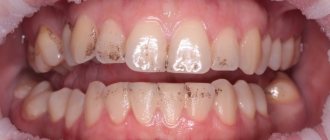Herpes
is a viral disease. One of the most well-known manifestations of a herpes infection is small, clear, painful blisters on the lips. Previously, in such a case they said “a cold on the lip popped up”, now they more often talk about “herpes on the lip”.
However, the family of herpes viruses is quite large. There are several types of herpes virus that can infect the human body. The most studied types are:
- herpes simplex virus type 1
(HSV-1). It is he who is responsible for pimples on the lip. HSV-1 primarily affects the mucous membranes of the lips, oral cavity and nasopharynx. Herpetic rashes can also appear within the nasolabial triangle (in particular, on the wings of the nose), less often on the cheeks and other parts of the face. Recently, HSV-1 quite often becomes the cause of herpetic lesions of the genital area, where it is introduced through oral sex; - herpes simplex virus type 2 (HSV-2) – genital herpes
. Main manifestations: redness, the appearance in the area of redness of bubbles filled with liquid, tending to merge, the appearance of erosions and crusts at the site of the bubbles, itching, headache and muscle pain, increased urination; - chickenpox virus
(varicella) is a type 3 herpes virus. In people who have already had chickenpox, this type of virus causes herpes zoster. Therefore, this type of herpes is also called Varicella-Zoster; - Epstein-Barr virus
(Epstein-Barr viral infection - EBVI) is a type 4 herpes virus. It is the causative agent of mononucleosis, causes malignant diseases of lymphoid tissue, and is considered the cause of chronic fatigue syndrome; - cytomegalovirus
– herpes virus type 5. The virus poses a threat to children during fetal development. May affect internal organs.
Causes of herpes
Herpes simplex virus type 1 (HSV-1) can be transmitted through household contact. Airborne transmission is also possible.
The airborne route is the main route of infection with the varicella zoster virus.
Genital herpes and cytomegalovirus are transmitted sexually.
You can also become infected with herpes through blood or saliva. The virus can be transmitted through saliva through kissing. Small children who put things in their mouths every now and then are also very vulnerable. If at least one child in a children's group is infected, a rapid spread of the infection can be expected.
Classification of viruses
According to the existing international classification, primary and recurrent genital herpes . The latter, in turn, is divided into typical and atypical clinical forms and asymptomatic viral shedding.
The term “genital herpes” arose at the beginning of the 20th century. to designate the lesion on the skin and mucous membranes of the external genitalia. With the development of virological research methods, information about “atypical” forms of the disease began to appear. The diagnosis “atypical form of genital herpes” is made by gynecologists to designate a chronic inflammatory process of the internal genitalia (colpitis, vulvovaginitis, endocervicitis, etc.) in the presence of a laboratory confirmed herpetic nature of the disease, in contrast to the “typical” picture of the disease, in which on the mucous membrane These organs have lesions with vesicular-erosive elements. At the same time, herpetic lesions of the urethra, anal area and rectal ampulla fall out of this group, although these organs are anatomically and functionally closely related to the genital area.
Research conducted at the Herpetic Center has shown that diagnosing the HSV virus is now complicated due to the fact that in 65% of cases the disease is atypical.
Herpes symptoms
Currently, most people are infected with some type of herpes virus. It is believed that antibodies to the Epstein-Barr virus can be detected in almost every adult (up to 98% of the adult population of the Earth). Antibodies to herpes simplex virus type 1 are detected in 90% of the adult population of large cities.
However, as a rule, carriage of a herpes infection does not lead to the development of the disease. The herpes virus is activated when the body's defenses decrease. The weaker the immune system, the more likely the virus is to transition from dormant to active.
That is why the herpes simplex virus type 1 is popularly called “cold on the lip.” The appearance of herpetic rashes is usually preceded by a common runny nose, that is, ARVI. The disease weakens the immune system, which is what the herpes virus takes advantage of.
Symptoms of herpes simplex
When infected with herpes simplex virus type 1, the incubation period ranges from 1 to 8 days. Typical symptoms: chills, fever up to 39-40°C, headache, general weakness and drowsiness. Then redness appears, in place of which characteristic bubbles form. When the oral mucosa is affected, blisters are usually found on the inside of the lips, tongue, and less often on the palate, palatine arches and tonsils. Bubbles appear at the site where the virus enters the mucous membrane. Subsequently, the bubbles burst, leaving behind painful erosions.
The disappearance of symptoms does not mean complete recovery. The virus remains in the body and after some time (in conditions of decreased immunity) a relapse of the disease is possible. Relapses can occur 1-3 times a year for several years and even decades.
Symptoms of genital herpes
The incubation period of genital herpes lasts from 1 to 10 days, after which itching (burning) may be observed in the areas of future rashes. After which swelling appears, and then groups of bubbles appear on the mucous membranes of the genital organs. The inguinal lymph nodes are enlarged. The blisters burst and erosions and ulcers form in their place. The process can last from two to five weeks.
Relapse of the disease is possible within two weeks after the initial lesion. Relapses occur in at least half of those who have recovered from the disease.
Which doctor's help might be needed for herpes?
With the questions “what causes herpes to constantly appear on the lips” and “I’m tormented by herpes - what to do?” You can contact your therapist first. He will subsequently refer you to an infectious disease specialist or dermatologist (if we are talking about an oral virus). Patients with a genital infection should see a gynecologist (women) or a urologist (men). Since the pathology may be associated with diseases of the internal organs, you may need to consult a gastroenterologist, hepatologist or pulmonologist.
Methods for diagnosing herpes
Diagnosis of herpes is carried out, first of all, on the basis of examination of the patient, since herpetic rashes have a certain specificity. However, your doctor may order laboratory tests. Laboratory tests can detect infection even in the absence of obvious manifestations.
Herpes test
Be prepared that if you suspect a herpes infection, the doctor will write a referral for a blood test, which will determine the presence of antibodies to the herpes virus in the blood. Based on the results of the analysis, it will be possible to judge not only the presence of the pathogen, but also its activity.
More information about the diagnostic method
Sign up for diagnostics To accurately diagnose the disease, make an appointment with specialists from the Family Doctor network.
How does herpes develop?
Herpes has several stages of development:
- at the first stage, unpleasant sensations appear in the lip area, already at this time it is necessary to begin treatment of herpes in order to prevent the transition to the next stage;
- at the second stage, inflammation of the mucous membrane appears, small blisters may appear;
- at the third stage, the blisters enlarge and may burst, leaving small ulcers in their place;
- The fourth stage is characterized by the appearance of scabs at the site of ulcers, which disappear upon healing.
It is important to monitor your body, and if other symptoms appear and your condition worsens, contact the clinic for competent help.
Treatment methods for herpes
Treatment of herpes is aimed at suppressing viral activity, as well as increasing immunity. Oral and topical medications may be prescribed.
The selection of drugs is carried out by a doctor depending on the type of disease (type of infection), as well as on the location of the lesion.
It is impossible to completely eliminate the herpes virus from the body. That is why it is important to always maintain the body’s defenses at a sufficiently high level, and also to prevent re-entry of the virus.
Prevention of herpes
If a person close to you has manifestations of herpes (“a cold has popped up on the lip”), try to ensure compliance with the following hygiene rules:
- use an individual towel and personal hygiene products (soap, toothbrush, etc.);
- be careful with cosmetics: do not use lipstick of a sick person;
- If you have genital herpes, avoid sexual intercourse.
Make an appointment Do not self-medicate. Contact our specialists who will correctly diagnose and prescribe treatment.
Rate how useful the material was
thank you for rating
How to treat herpes?
It is impossible to completely destroy a virus that has entered the body. But it is quite possible to suppress its activity so much that it does not bother you. In modern medicine, an integrated approach is used for this. The best results are obtained by combination therapy, which involves the use of antiviral drugs (they are available in the form of drugs for internal use and in the form of external agents), as well as drugs that strengthen the immune system. In some cases, the patient is additionally prescribed local analgesics and physiotherapeutic procedures.
Many people are interested in whether it is possible to burn herpes with alcohol? Alas, this method does not affect the virus, but only damages the mucous membranes, so it is better to use special ointments.
What remedies are usually prescribed for herpes on the lips? The table shows a list of the most common medications used to treat the virus.
| Name, dosage form | Description |
| Acyclovir (aka Zovirax). Available in the form of tablets, cream, eye ointments, injection solutions. | An inexpensive antiviral drug that stops the replication of the virus. Addressed to adults and children over 3 years old. Not recommended for use during pregnancy. Antiviral ointment |
| Valacyclovir (aka Valtrex) Available in the form of 500 mg tablets. | One of the best drugs for herpes. It differs from Acyclovir in the method of delivery of the active ingredient. Suppresses the activity of the virus and reduces symptoms. When taking the drug, the risk of infection through contact with other people is reduced. Treatment of herpes in 3 days |
| Famciclovir (aka Famvir) Available in the form of tablets 125, 250 and 500 mg. | Just like Acyclovir and Valtrex, it blocks the replication of the virus. Helps in the treatment of simple virus and the virus that causes chickenpox. Famciclovir is effective against viruses resistant to Acyclovir. Famciclovir |
| Panavir Available in the form of a solution for intravenous injection, as well as in the form of a gel and suppositories (suppositories). | Antiviral, anti-inflammatory and immunomodulatory drug of plant origin. Increases the body's resistance to infections and has an antipyretic effect. |
| Docosanol (aka Erazaban) Available in the form of a cream for external use. | Has an antiviral effect. Intended for use in adults and children over 12 years of age. Pregnant women are prescribed with caution. |
| Proteflazid Available in the form of drops. | Antiviral agent for systemic use. Intended for the treatment of herpes simplex in children and adults. Used in pediatric practice (including in children under 1 year). |
| Flavoside Available in the form of syrup. | Effective in the treatment of herpes simplex, as well as in the treatment and prevention of influenza. Used in pediatric practice (including in children under 1 year). |
The presented list of drugs is far from complete - the doctor, depending on the characteristics of a particular patient, may recommend other drugs. For example, in some cases antibiotics cannot be avoided (if there is a risk of contracting other infections).
Precautionary measures
In order for the disease to pass in a mild form and its complications to appear, the following recommendations should be followed:
- Rule #1. Avoid touching your face with your hands, especially in the area of blisters. Otherwise, you risk spreading the infection to a larger area of skin.
- Rule #2. During illness, be especially careful about your personal hygiene.
- Rule #3. Isolate yourself and try to avoid close contact with people, especially the elderly and children.
Causes
There are many provoking factors leading to exacerbation of the disease. In addition to the weakening of immune forces, there are a number of other reasons:
- Emotional stress, physical fatigue, stressful situations.
- Long-term insolation.
- Surgical interventions.
- Taking immunosuppressive drugs.
- Hormonal imbalances.
In addition, there may be a combination of several negative factors leading to the activation of infection in the body. During illness, it is important to isolate yourself from others.
Reminder in case of illness
It must be remembered that when a rash appears, a person becomes acutely contagious. Moreover, not only those around him can suffer, but also the sick person himself. For example, from a lesion on the lips with dirty hands, the herpes virus can be carried into the eyes or genitals.
Therefore, it is important to follow the following rules
- Do not touch lips affected by rashes. If you touch them, wash your hands thoroughly.
- Use your own towel and utensils.
- If your lips are affected, do not squeeze the blisters or pick off the scabs. This may cause additional skin infection.
- Refrain from kissing and oral-genital contact.
- If you wear contact lenses, do not wet them with saliva to moisten them.
- Apply antiviral cream to your lips not with your fingers, but with cosmetic sticks.
Prevention and treatment of the disease
A herpetic infection can resolve on its own without treatment, but in this case the recovery period will be longer and range from 1 to 3 weeks. If you start taking medications on time, the disease will go away faster and easier. Treatment should begin when the first symptoms appear - burning and tingling, in places typical for the virus.
Also, do not forget about preventive measures. Try to plan your day correctly, get enough sleep, and avoid stressful situations. On sunny days, use protective creams, and in the cold season, moisturizing hygienic lipsticks.
The following groups of drugs are used to treat herpes:
- Antiviral agents in the form of ointments and tablets. The most commonly used are Acyclovir, Penciclovir, and Valaciclovir. When using them, the duration of the disease can be reduced to three days.
- Painkillers and antipyretics. They are used to relieve unpleasant symptoms: high fever, itching and burning. If such manifestations occur, you can take paracetamol or any NSAID (Nise, Nimesil, Ibuprofen).
- Folk remedies also help combat discomfort during illness. Gel with aloe vera extract, witch hazel and lemon balm have proven themselves to be effective in treating infections.
What is herpes and what types does it happen?
Herpes is an infection caused by the herpes simplex virus. It is transmitted during any contact. This can be touching, kissing, petting and any type of sex. Herpes is also classified as a sexually transmitted infection. Sometimes it’s enough to use someone else’s chapstick and the virus will be passed on to you.
It looks like a blistering rash on the skin or mucous membranes. Herpes usually appears on the face, lips or genitals. Elsewhere it is rare and occurs mainly in people with weakened immune systems. Herpes in Greek means “creeping”, and it’s not just that: you can become infected through sexual contact, and the virus will appear on the face, this is its peculiarity.
I often get “colds” on my lips. Is there any way to get rid of herpes once and for all?
Once you get infected with the virus, you will become inseparable. Once the virus enters the body, it continues to live in the body for the rest of its life, perhaps asymptomatically or with relapses. It penetrates the nervous system and settles in the nerve ganglia.
Even our ancestors suffered from herpes
The herpes virus could not be identified until 1940. But it turns out that people had it 6-7 million years ago. It was probably transmitted to humanity by monkeys. Scientists even found the hominid species that was the first to become infected. It is believed that he ate the meat of a monkey infected with the virus and became the first carrier.









